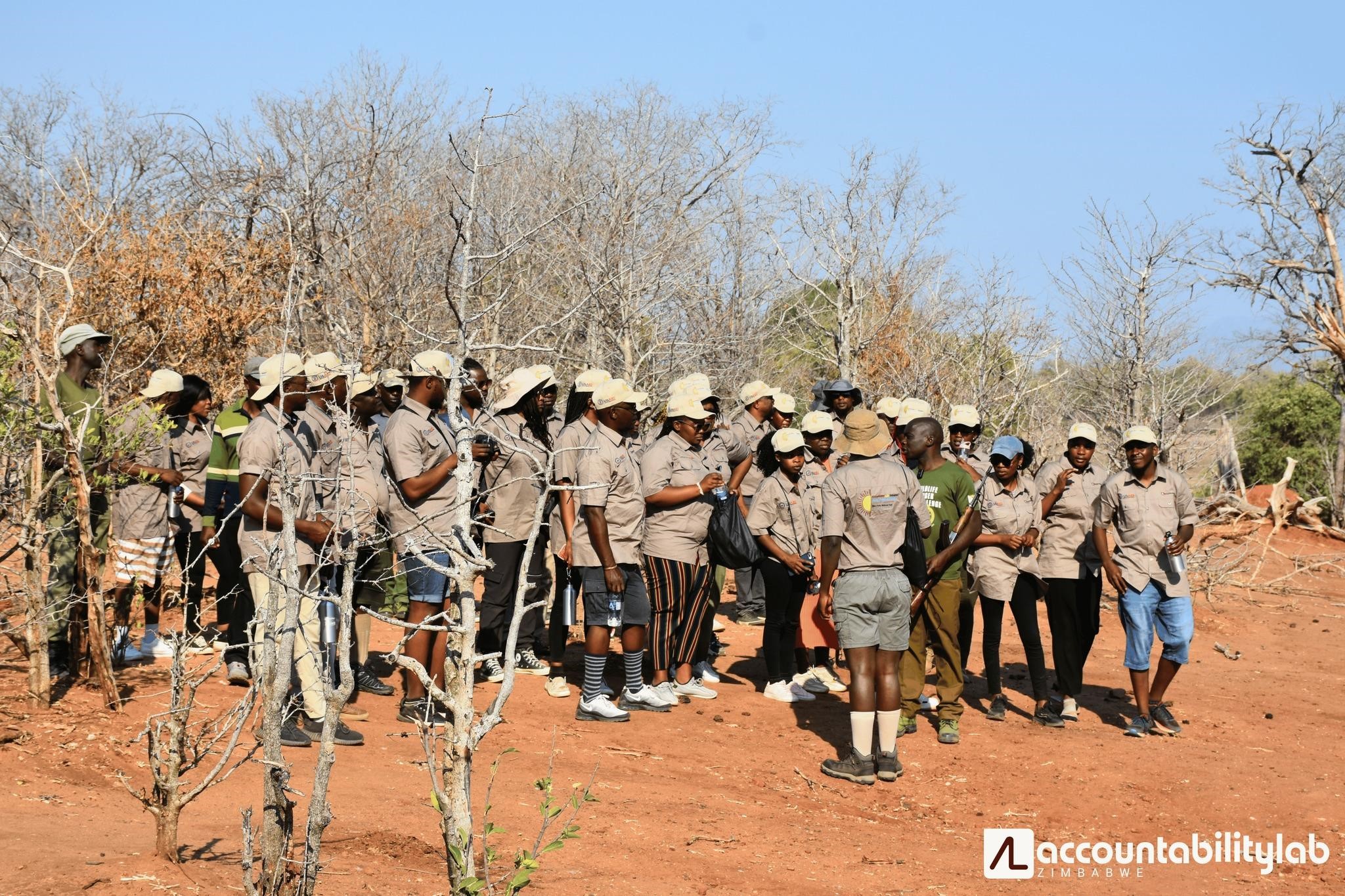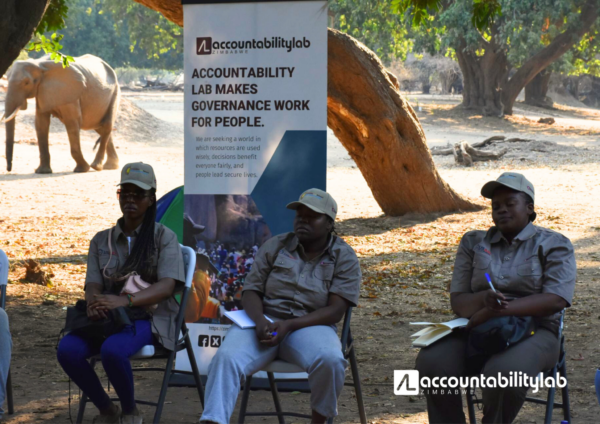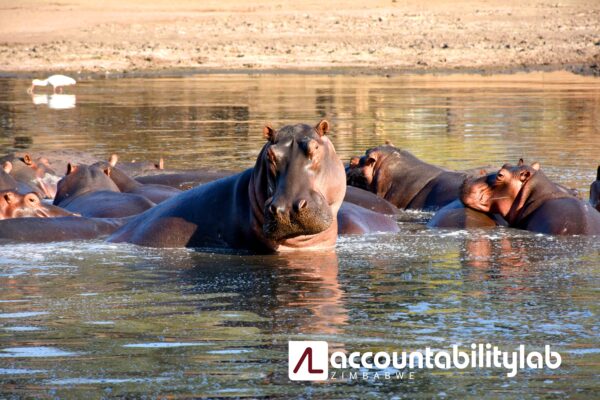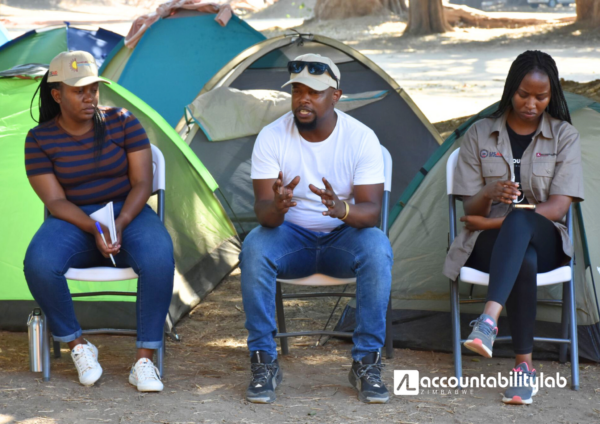NEWS

IN BRIEF
During a nature walk at Mana Pools, a tour guide […]
SHARE
During a nature walk at Mana Pools, a tour guide explains the impacts of climate change on the local ecosystem. Participants observe the changing landscape and wildlife, deepening their understanding of the urgent need for environmental conservation.
Innovation is one of the core values at the heart of Accountability Lab. Over the past four years, this has been harnessed by working closely with Voice2Represent finalists, Film Fellows, and Accountapreneurs. We achieved a significant milestone this year in equipping this diverse network of accountability champions with foundational knowledge about climate change through experiential learning in Mana Pools. This immersive activity explored the intersections of climate justice, accountability, youth, and gender.
Immersive Experience at Mana Pools

A panel discussion on climate action takes place in the heart of the wilderness, with wildlife carrying on its daily routines nearby. The natural setting highlights the urgency of addressing climate change while coexisting with nature.
Mana Pools, a conversation area along the Zambezi River, provided the perfect backdrop for participants to observe the growing effects of the changing climate on the environment and wildlife. Setting our learning sessions against the backdrop of the pure beauty and wilderness of this world heritage site underscored the urgency of accountable climate action, particularly for young people.
The Park is famous for its walking safaris. Our class benefitted from direct observation of flora and fauna, and learning discussions with tour guides explaining changes in the natural environment and in the behaviour of wildlife. A key observation was Long Pool, the largest of Mana’s four pools (Mana means “four” in Shona). Despite its ability to retain water year-round, Long Pool is experiencing unusually low water levels due to rising temperatures and increased evaporation from the hot, humid weather.

A family of hippos rests in the shallow waters of Long Pool, where they were once fully submerged. Due to the significant decrease in water levels, the animals are now more exposed, revealing the effects of climate change on their habitat.
Discussions about the Zambezi River also revealed troubling trends, such as the drying up of once-vibrant water sources and the formation of new islands as water levels declined. Even drought-resistant plants and trees were struggling, serving as a stark reminder of the worsening climate crisis.
Accountability in Climate Action
A major highlight of the event was a panel discussion on the intersection of accountability in climate action, youth engagement, gender, and local governance. Set in the wilderness, the conversation took place against the backdrop of elephants gracefully passing by and monkeys chattering—just 50 meters from the mighty Zambezi River. The scenic yet rapidly changing environment served as a powerful reminder of the urgent need for accountable climate action.

A panel discussion on “Accountability in Climate Change: Gender, Youth, and Local Governance” featured insights from panelists Sydney Chisi, Mr. Frank Mpahlo, and Vimbai Chiweshe, with Bathabile Dlamini serving as the moderator.
Citizen Participation: A Key Element of Accountability
Citizen participation is central to accountability in climate processes. Governments must engage in genuine consultative processes, giving citizens—particularly those from the most affected communities—a platform to influence climate policies. This type of consultation ensures that interventions are inclusive, equitable, and tailored to local contexts. Without this meaningful participation, climate policies risk overlooking the marginalized groups that are often the hardest hit by climate impacts, including rural women, youth, and indigenous communities.
The Role of Local Governments
Local governments play a pivotal role in ensuring accountability in climate actions. Since climate impacts are felt most intensely at the local level, they must involve civil society, community leaders, and citizens in decision-making processes. This inclusion ensures that climate adaptation and mitigation strategies align with the specific needs of local communities. Whether it’s disaster preparedness or sustainable energy projects, local input is essential for creating climate solutions that are not only effective but also relevant to those most affected by climate change.
Challenges: Corruption and Climate Action
Another significant discussion focused on corruption as a barrier to accountability. The diversion of climate finance and opaque decision-making processes often lead to ineffective implementation of climate policies. For instance, corruption can undermine projects in the renewable energy sector, where the lack of transparency in procurement and implementation allows monopolies and elites to capture resources intended for community benefit. Ensuring that climate finance reaches the communities in need requires addressing these governance challenges.
Gender and Climate Vulnerability
Our sessions explored the role of gender in climate vulnerability. Women, especially in developing regions, face disproportionate impacts due to their roles in caregiving, farming, and managing households. Cultural barriers, lack of access to education, and exclusion from leadership roles further exacerbate these challenges. Therefore, gender-responsive climate interventions are critical to addressing these vulnerabilities. Providing women with access to resources, information, and decision-making platforms can enhance the resilience of entire communities and lead to more effective climate action.
Innovative Discussions: Carbon Credits and Artificial Intelligence
The learning continued around a campfire where the fellows delved into the concept of carbon credits. Carbon credits were discussed as an essential tool in the fight against climate change, providing a market-driven mechanism to reduce greenhouse gas emissions. The facilitator, Dr. Byron Zamasiya emphasized that good governance and transparency are essential for ensuring that carbon credits are used effectively to offset emissions while benefiting local communities.
The discussion expanded to include how Artificial Intelligence (AI) presents opportunities for discovering climate change solutions. By harnessing AI, there’s potential to better understand climate impacts, predict future challenges, and develop interventions tailored to specific regions or communities.
The immersive experience at Mana Pools highlighted the urgent need for accountable climate action. Youth participation, gender-responsive interventions, and corruption-free governance were all emphasized as crucial elements in combating climate change. This gathering of Voice to Represent Fellows, Film Fellows, and Accountability Incubators showcased the importance of equipping the next generation with the tools, knowledge, and platforms to drive meaningful change in their communities.
As the climate crisis intensifies, experiential learning, like this event, provides a powerful way to deepen understanding and foster solutions that are inclusive, equitable, and sustainable.
—
Bathabile Dlamini is the Media and Communications Officer for Accountability Lab Zimbabwe
